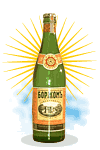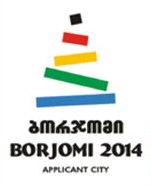 Moscow is now turning from wine to water in Russia's ongoing trade war with Georgia. As of today, Saturday 7 May, Georgia's flagship mineral water - Borjomi - is banned from the Russian market, BBC reports. Borjomi mineral water is Georgia's largest export commodity, and - as with wine - some 80% goes to Russia. A little more than a month ago, Russia banned the imports of Georgian wines. It has now become apparent, that Moscow is waging a trade war against Tbilisi to stifle the weak Georgian economy.
Moscow is now turning from wine to water in Russia's ongoing trade war with Georgia. As of today, Saturday 7 May, Georgia's flagship mineral water - Borjomi - is banned from the Russian market, BBC reports. Borjomi mineral water is Georgia's largest export commodity, and - as with wine - some 80% goes to Russia. A little more than a month ago, Russia banned the imports of Georgian wines. It has now become apparent, that Moscow is waging a trade war against Tbilisi to stifle the weak Georgian economy.As with the wine ban a month ago, Russia's chief epidemiologist, Gennady Onishchenko, blames it on failing purity standards. This comes as somewhat of a surprise to Russian consumers, as the Borjomi trademark has been one of purity ever since tsarist times. For some reason, Borjomi is for long renowned among Russians as the best bottled water on the market, although most western customers would shed it due to its high salinity.
Since Georgia's rose revolution, the city of Borjomi has become somewhat of a symbol internationally of the new and independent Georgia. Thus, last Augus
 t, the leaders of the coloured revolutions - Georgia's Saakashvili and Ukraine's Yushchenko - signed the Borjomi declaration aiming at European and Euro-Atlantic integration to the entire "Baltic-Black Sea-Caspian" area. To the Kremlin, the declaration was seen as anti-Russian and a challenge to Moscow's influence over post-soviet space. Furthermore, Borjomi is also a candidate for the 2014 Winter Olympics, which but a few years back would have been next to impossible. That the Borjomi mineral water has become the next victim in Russia's trade war on Georgia should therefore come as no surprise.
t, the leaders of the coloured revolutions - Georgia's Saakashvili and Ukraine's Yushchenko - signed the Borjomi declaration aiming at European and Euro-Atlantic integration to the entire "Baltic-Black Sea-Caspian" area. To the Kremlin, the declaration was seen as anti-Russian and a challenge to Moscow's influence over post-soviet space. Furthermore, Borjomi is also a candidate for the 2014 Winter Olympics, which but a few years back would have been next to impossible. That the Borjomi mineral water has become the next victim in Russia's trade war on Georgia should therefore come as no surprise.Since Moscow's campaign against Georgian products began, the government in Tbilisi has accused Russia of waging economic warfare against Georgia. Despite Russian assurances that this is not the case, a trade war must now be regarded as a fact to Russians and international observers alike. As for Borjomi's faithful Russian consumers, they might well conclude that "maybe it’s time to send it all to the devil and go to Kislovodsk."
Russia, Georgia, conflict, trade, water, Borjomi



4 comments:
one of the owners used to be (or still is) Salford Group (not sure about the name) - a financial vehicle of Borys Berezovsky... Knowing how Berezovsky is popular with Russian government and President, maybe the latest news and the fact I mentioned are somehow interrelated?
Dear Cherolex,
Thank you very much for that interesting piece of information. I did not have the faintest idea that this might have been an additional factor to the ban.
Yours,
Vilhelm
considering the fact that business and political interests in Russia (and in most countries of Central Eastern Europe, and the world maybe) are almost equivalent or belong to the same people, explanations/interpretations of some events in business-politics dimension makes sense...
Dear Cherolex,
I cannot agree more with you on how business and politics are coalesced in Russia. However, one does not always know all relationships and conditions, why the information on the Salford group and Berezovsky shed some new light on the matter.
Yours,
Vilhelm
Post a Comment